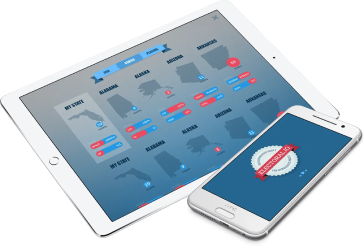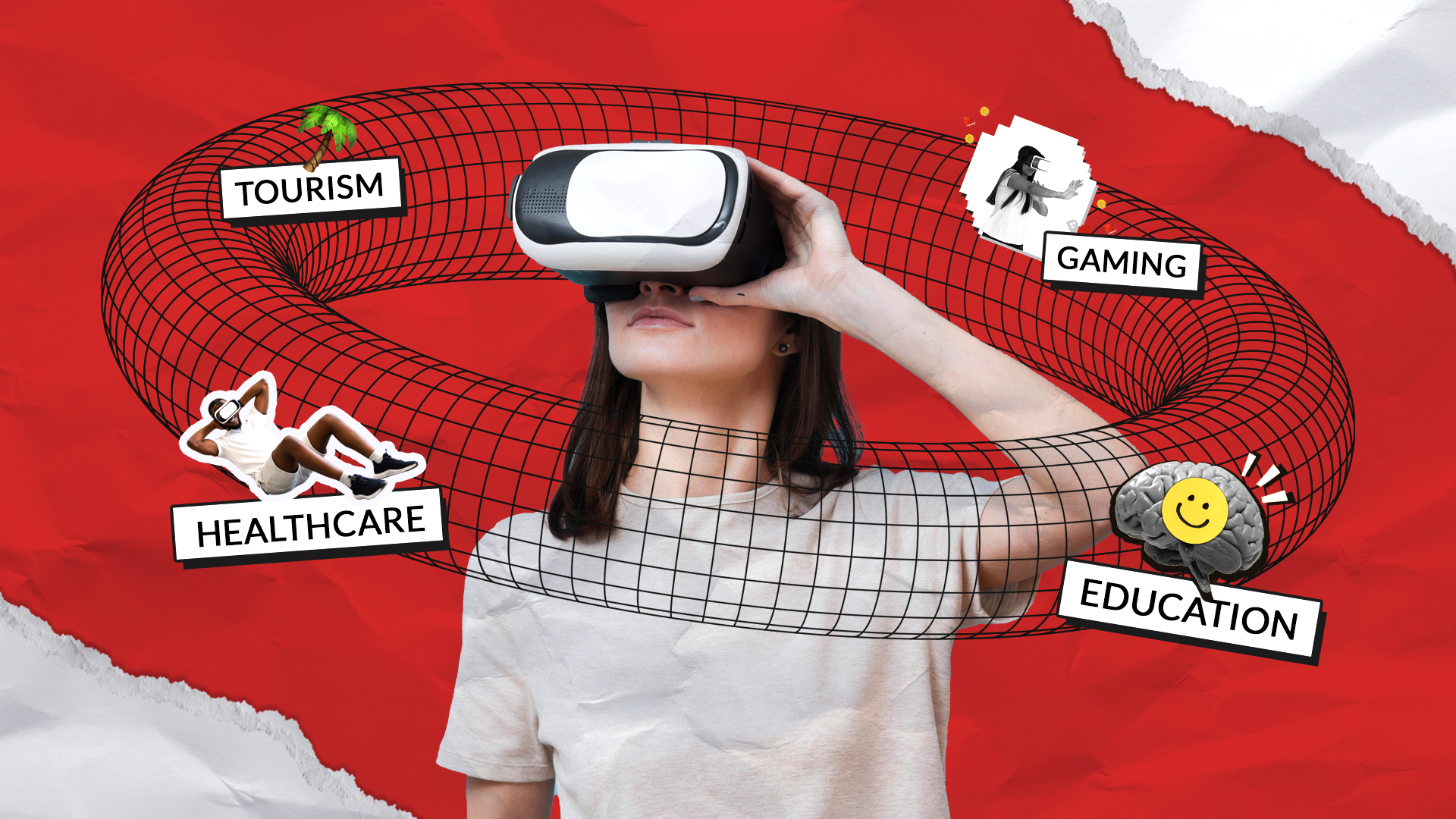It’s 2024, and the metaverse is officially dead, or is it? For sure, the concept was overhyped and didn’t leave up to its countless promises. Does it mean there are no profitable use cases left in the field? Absolutely not. Actually, technologies lying at the core of metaverse solutions, such as VR/AR, blockchain, and AI continue rapidly developing and open new business opportunities.
In this article, we’ll describe only practical business ideas for metaverse that are easy to comprehend, market, and monetize. Let’s go!
Understanding the Metaverse Landscape
The metaverse envisioned earlier doesn’t make sense anymore. The idea of a digital universe consisting of fully interoperable 3D worlds is utopic, at least for now. For several reasons – technical challenges, accessibility, fragmented user base, and cybersecurity risks.
Instead, entrepreneurs are building VR- and AI-powered solutions that bring tangible benefits for users and are tailored to specific niches. Even though the metaverse startup funding decreased in 2023 compared to 2022, it didn’t stop entirely. Investors continue pouring money into metaverse solutions because they see long-term value.
A case in point is Futureverse, a startup providing the infrastructure and tools needed to develop metaverse solutions. It received $54,000,000 funding in 2023, when the metaverse was already getting a lot of heat from skeptics.
The metaverse market worldwide is forecast to reach $74.4 bln in 2024 and continue growing steadily, reaching $507.8 bln by 2030. Countries like the US, China, Japan, the UK, and Germany have the biggest market share, respectively.
We’ve already talked about metaverse use cases, illustrating how brands are using existing solutions for self-promotion. In this article, we’d like to focus specifically on starting a business in the metaverse.
With an emphasis on creating meaningful user experiences, metaverse companies have a good chance to succeed. But what metaverse business model is the best? What niches offer the most ample metaverse business opportunities? Let’s find out.
Top 9 Metaverse Business Ideas
We’ve compiled the best metaverse business ideas across several industries, considering factors like market forecasts, companies with a similar business model, technical feasibility, and common sense. We’ve been delivering software services since 2005, so we know what it takes to build a successful product from the ground up.
Metaverse Gaming
Judging by the amount of investment, VR gaming is one of the most high-yield niches for starting a metaverse business. It is expected to attract $17.6 bln of investments in 2024, whereas the metaverse training niche will receive only $4.1 bln.
Virtual reality, augmented reality, and artificial intelligence top the 2024 game development trends, and these are the technologies that power metaverse gaming. The success of virtual worlds created on Roblox prove that players look for experiences beyond traditional gaming.
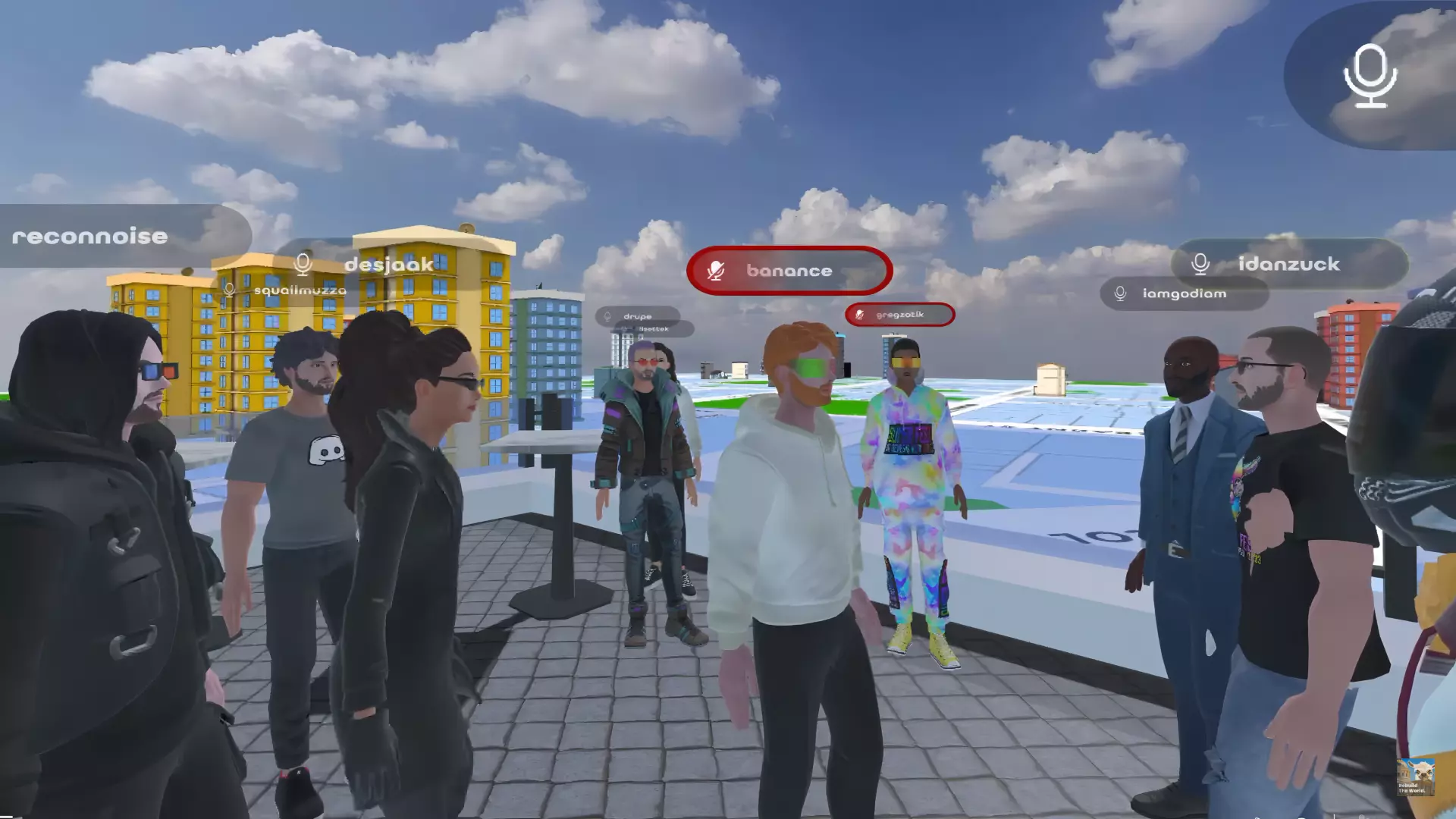
This market is probably the most crowded in the metaverse. Still, that also means you have plenty of metaverse business models to explore and see what works and what doesn’t.
Opportunities:
- Social interaction: Metaverse games go beyond typical game objectives. They allow users to interact freely, whether they’re teaming up to complete a quest or just chilling in a virtual cafe.
- Persistent worlds: One of the primary differences between regular and metaverse games is that the metaverse is a persistent world where things keep developing even if the user is offline. This creates more lasting memories and more immersive experiences.
- Asset ownership. Blockchain-based metaverse games make it possible for players to have true ownership of their assets. In traditional games, assets are stored on centralized servers and can be lost.
- Digital economy: Play-to-earn metaverse games offer players and game designers an opportunity to monetize their time spent playing and developing the game.
- VR/AR integration: The use of VR/AR provides an unmatched level of immersiveness and interactivity. The demand in VR games will grow along with the adoption of these technologies.
Challenges:
- Virtual economy sustainability: Building a sustainable in-game economy requires profound expertise and a humane approach. We’ve seen the failure of Axie Infinity who’ve been accused of Ponzi schemes and saw a drastic user decline after their in-game currency lost its value. Also, regulations regarding virtual economies vary by region.
- High development costs: Building a feature-rich metaverse game requires significant resources. You need a number of highly skilled professionals – from game designers, game analysts and economists, 3D artists, UI/UX designers to server- and client-side programers, blockchain developers, VR/AR experts, and QA engineers.
- Complex user acquisition: Additional costs should be allocated for PR and marketing campaigns. Attracting players to a new metaverse game is not an easy task.
- User retention: Once you’ve attracted users, you need to figure out how to keep them. You need to continuously create relevant content, remove bugs, and improve the experience.
- Cyber threats: To protect the sensitive information of your players, such as IP addresses, social media accounts, and credit card details, you need to invest in cybersecurity. This means implementing robust authentication and authorization, conducting code reviews and security audits, updating your software, educating your community, among other things.
- Regulatory compliance: Navigating the legal aspects, especially with virtual economies, is complex and depends on your location.
Monetization strategies:
- Selling virtual items, cosmetics, and power-ups
- Offering tiered subscriptions for premium content and features
- Charging for special events or exclusive gaming sessions
- Taking commissions on USG content sold on your marketplace
- Selling in-game assets as NFTs, allowing players to own and trade them
- Integrating brand promotions and sponsored content within the game
Competitors: Decentraland, The Sandbox, Roblox, Upland, Genesis Worlds
VR Fitness and Wellness Platform
Creating a VR platform for the fitness and wellness niche is not a novel idea, but you can always build on the existing solutions and improve them. Given the ever increasing interest in personalized workouts from home, developing a VR fitness platform has a lot of potential.
First off, it allows people to do workouts while having a lot of fun. VR apps are usually super gamified so it really does feel like playing a game. This implies there’s a higher chance that the users will stick to their routines and will get better results.

Also, VR apps make it possible to work out together with friends even when all of them are miles away from each other. They can create their own avatars and see each other moving to the beat.
Opportunities:
- Growing market: The metaverse health and fitness market is expected to grow from $8.5 bln in 2024 to $56.1 bln in 2030 with the US and China leading the way in creating VR fitness experiences.
- Rising interest: The demand for online fitness solutions has vastly increased during COVID-19 and keeps growing. A metaverse fitness and wellness platform satisfies the needs of those users who hate going to the gym or following dull online workouts. According to CivicScience, 52% of US adults that exercise weekly or monthly do it from home, whereas only 28% go to a gym.
- Limited competition: The VR fitness niche is not overcrowded, so new businesses have a chance to grab their market share.
- Community and social interaction: Metaverse apps are great for community-building efforts. Group challenges, leaderboards, avatar customizations, fitness webinars, and built-in forums increase user engagement and create a sense of belonging.
Challenges:
- High development costs: Building a metaverse platform from scratch requires solid investments in its infrastructure and ongoing software development. If you are planning on hiring a metaverse development company, make sure to request a consultation dedicated specifically to cost planning and reduction.
- Technological hurdles: Even though the VR technology has taken a great leap forward, it has limitations in terms of motion tracking and field of view.
- Comfort: VR solutions require a very thoughtful design to prevent issues like motion sickness, disorientation, or eye strain.
- Content creation and maintenance: Developing high-quality, engaging VR content is costly and time-consuming.
- Standing out: Competing with established market players requires continuous innovation and serious marketing efforts.
Monetization strategies:
- Charging a monthly/annual subscription fee
- Selling access to exclusive content, avatar skins
- Integrating sponsored content from fitness brands, equipment manufacturers, or wellness providers
- Selling anonymized user data to fitness companies and market researchers
Competitors: FitXR, Supernatural, VZFit, OhShape, BODYCOMBAT XR
Virtual Events and Entertainment Metaverse
The virtual event industry offers plenty of metaverse business opportunities. The thing is, traditional online events are known to be less engaging than in-person ones. With a metaverse solution, event and entertainment companies can stream their content innovatively.
The immersive nature of VR captivates users much more than a 2D stream on a screen. Also, not all metaverse solutions are reliant on VR. You can build a beautiful 3D venue that users can explore as if playing a PC game while consuming content and interacting with other attendees and presenters.

You can host several simultaneous events in different virtual arenas, just like during an offline event. You can entertain and empower users through avatar customizations, emotes, text chats, and user-generated content – the interactive activities are endless.
Opportunities:
- Growing adoption: VR/AR adoption is still in its infancy; however, it is projected to grow. By 2027, we can expect over 120 mln VR users. Market researchers also predict the growth of live event and entertainment segments within the VR market – from 0.8 bln in 2020 to 4.1 bln in 2025.
- Unique experiences: VR events offer a huge advantage over typical online events due to their creative freedom, higher level of interactivity, and spatial audio.
- Global reach: Metaverse platforms for the event and entertainment industry allow bypassing geographical constraints and hosting thousands of attendees.
- Cross-platform accessibility: While primarily built for VR, metaverse platforms could be designed for other devices like PCs, consoles, or mobile devices, to cater to the needs of people from different socioeconomic backgrounds.
- Networking and socialization: When developing a custom platform, you’re in control of your business in the metaverse. You can choose what social interaction tools to implement to increase user engagement – private messaging, community forums, collaborative workshops, themed mini games, etc.
- New revenue streams: Besides tickets and sponsorship plans, you can make revenue from selling virtual merchandise, in-world advertising, microtransactions.
Challenges:
- Scalability and performance: Virtual events require hosting large numbers of users interacting with the platform simultaneously. You need to lay out the right architecture from the very beginning. It’s gonna be costlier and more difficult to correct things further down the road.
- Latency and synchronization: Latency issues may occur for several reasons: server distance, network congestion, the quality of the user’s internet connection, differing hardware, rendering latency, and so on.
- Cross-platform compatibility: Since your solution will be accessed from different VR hardware and other devices, you need to ensure a seamless performance for all of your users, or at least their great majority.
- Content moderation: Real-time interactions, self-expression through avatars, multisensory experiences, and the ability for user-generated content leave plenty of room for exhibiting harmful behavior and assaulting other users. This may require combining AI and human moderation.
Monetization strategies:
- Arranging your own events and selling tickets with tiered pricing
- Selling virtual merchandise like digital clothing and accessories
- Partnering with exhibitors and sponsors to display their logos, products, or host branded events
- Integrating ads into the virtual environment, such as billboards
- Leasing your platform to event organizers and entertainment companies on a subscription-based model
Competitors: Sansar, Yahaha, HyperSpace, Virtway, vFairs
Virtual Training and Education Software
Developing a virtual training and education platform deserves to be among the best metaverse business ideas. Such platforms can cover the onboarding and professional development needs of large corporations with thousands of employees scattered across the globe. According to a recent immersive learning survey by Accenture, 90% of executives agree their existing training needs to be more effective and efficient.
Additionally, such platforms can be of interest to online education providers looking to improve the appeal and interactivity of their courses.

If you think about it, every industry requires employee training and upskilling so you can niche down and build a solution for a specific market segment. This way, it will be easier to promote your solution and establish your industry authority.
Opportunities:
- Immersive and engaging learning: VR allows learning providers to 3D visualize complex topics virtually, allowing students to easily understand abstract or highly technical concepts.
- Better knowledge retention: By stimulating multiple senses, VR experiences are way more memorable compared to regular online classes. This helps increase students’ attentiveness and information retention.
- Practical skill development: VR is used in simulation training solutions because it allows students to safely practice in a life-like environment without causing any psychological pressure. For example, practicing surgical procedures, conducting scientific experiments, or learning how to operate machinery can be first done in a risk-free VR environment.
- Customization: Off-the-shelf learning management systems offer limited customization tools. A custom-built metaverse platform for education will reflect your wealth of knowledge through features that meet your specific needs.
Challenges:
- Expensive hardware: VR headsets and related equipment are more on the high-end side, which means the user adoption won’t be as widespread as with affordable smartphone devices.
- New learning design: Creating learning experiences for VR requires completely different learning design approaches. There’s also a challenge in balancing educational content with gamification.
- Data privacy and security: VR platforms collect a ton of personal user data, such as eye-tracking, face expression tracking, movement data, etc. More so, VR solutions are susceptible to cyber attacks given their interconnected nature. So, be prepared for serious cybersecurity investments and compliance with data protection laws.
- Institutional adoption: Convincing educators and corporate trainers may not be easy and usually requires effective change management, infrastructure upgrades, and staff training.
Monetization strategies:
- Charging a subscription fee for access to premium VR courses and training modules, such as surgical simulations, historical tours, soft skills training, etc.
- Partnering with enterprises to create a custom metaverse training solution specifically for their needs
- Licensing your platform to educational institutions, training companies, and content creators
- Collaborating with VR hardware manufacturers to create platform-exclusive content
Competitors: Strivr, Bodyswaps, Victory XR, Immerse, SimX
Virtual Retail Store
Big fashion and beauty brands have been the first to do business in the metaverse. They quickly realized that they need to adopt new digital marketing strategies to lure in younger generations, such as Gen Z.
Virtual stores are not meant to replace traditional e-commerce platforms. They are important for building brand equity and increasing customer engagement through immersive and gamified commerce.
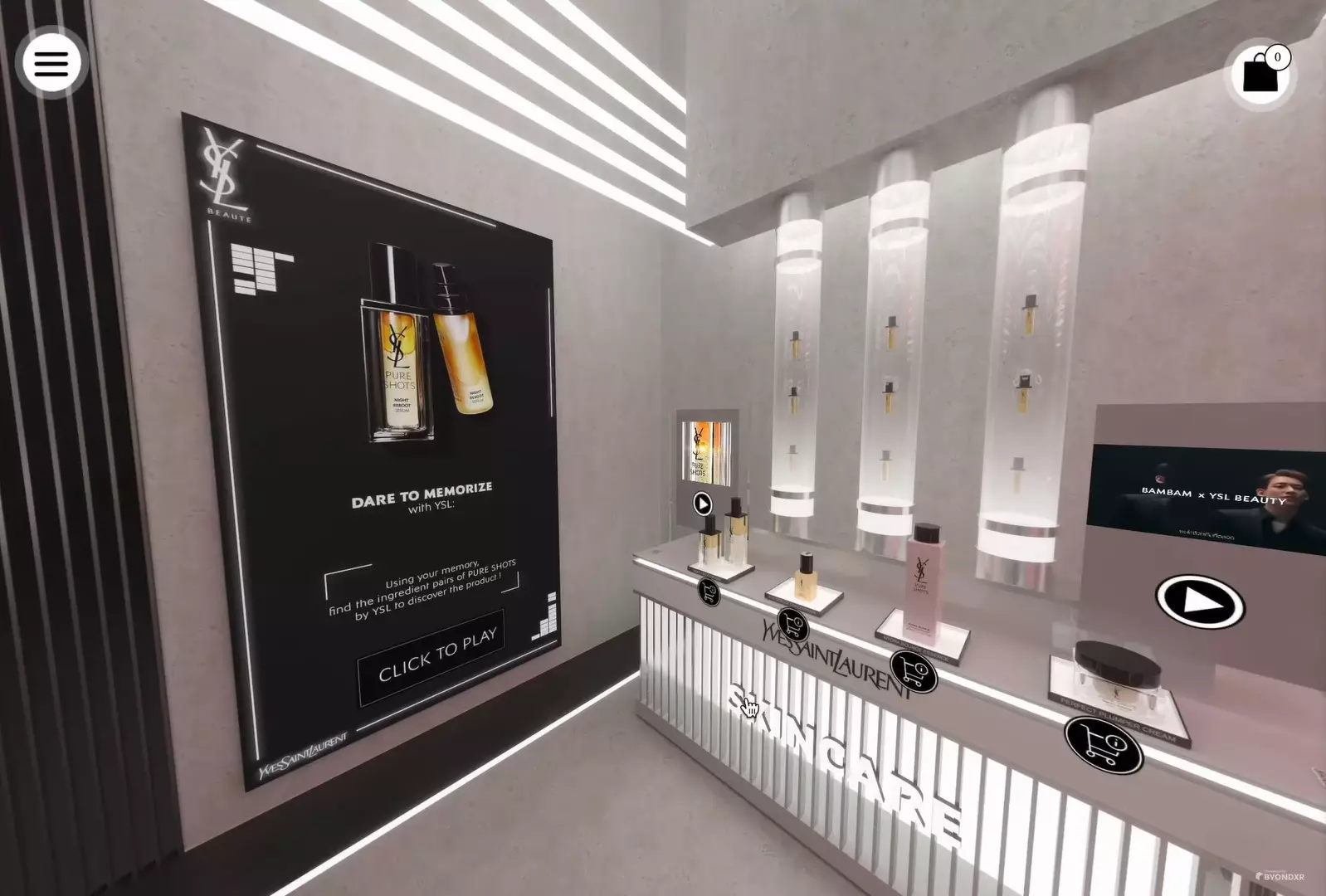
Virtual try-ons, shopping with friends through an invite link, branded games, a virtual outfit builder, a virtual stylist, color analysis quizzes – these are just some of the features that keep consumers captivated.
Opportunities:
- Tech-savvy demographics: Immersive shopping platforms cater to the needs of digital natives. As of 2022, 66% of Gen Z and 58% of millennials in France were interested in shopping on the metaverse.
- Interactive experience: Virtual stores can replicate the in-store experience, such as going into a fitting room, trying on clothes, and looking at them from different angles. They provide more tools to keep the user engaged compared to a traditional e-commerce platform.
- Social shopping: Virtual shopping platforms transform the typical online shopping journey into a shared experience. They enable clients to browse, discuss, and shop together, replicating the social and interactive aspects of in-person shopping.
- Behavioral analytics: Virtual stores can track user interactions with products, navigation patterns, heatmaps, and avatar customization choices to understand what items are of the highest interest, layout issues, and trends.
- Innovative marketing: Virtual stores are an additional channel for highly creative marketing campaigns. You can host sales, giveaways, fashion shows, and other entertaining events to build stronger relations with consumers.
Challenges:
- User adoption: So far, mostly big and luxury brands have tapped into this niche. It may be difficult to convince smaller brands to invest in the metaverse.
- Complex legal landscape: Different countries impose different data protection laws. So serving a global audience will require compliance with sometimes conflicting laws.
Monetization strategies:
- Partnering with fashion, beauty, jewelry, electronics, and automotive companies to help them build branded virtual stores and experiences
- Leasing virtual spaces to companies who want to design their stores on their own
- Enforcing transaction fees similar to e-commerce platforms like Shopify
- Selling anonymized consumer behavior data to third parties
Competitors: Obsess, ByondXR, Emperia, PixelPool, ReadySet
Virtual Social Media
When sifting through business ideas for metaverse, it makes sense to explore solutions that have stood the test of time. Second Life is one such example. It has transformed over the years and inspired other entrepreneurs to build virtual social platforms.
Virtual social platforms are not for everyone but they could be of interest to gamers, content creators and artists, socially isolated people, people fearing face-to-face communication, and anyone who loves exploring new technologies.

They can be designed in a way to unite people with shared interests, which aids in community-building efforts.
Opportunities:
- Virtual social media takes interaction to the next level, far beyond what traditional platforms offer. It’s not just about texting or talking; users can fully express themselves through customized avatars and dance moves, all while keeping their real identity private if they choose.
- Variety of activities: On virtual social media, one can do more than communicating and meeting new people. They can free-roam through a virtual world, visiting cafes, concert halls, or game arenas.
- Discovery and search tools: Virtual social media platforms should also enable users to easily find friends, discover communities around their hobbies or interests, events, or useful resources.
- In-platform currency: Consider introducing an in-platform currency to boost user engagement and reward participation and positive behavior.
- Open-world building tools: Users will stay longer on the platform if they have an opportunity to co-create and customize their environment. Create opportunities for user-generated content and make it easy to share those experiences.
- AI integration: Leverage AI to make your metaverse highly dynamic, personalized, and interactive.
Challenges:
- Multi-platform accessibility: Just a fraction of the users interested in exploring the metaverse own VR headsets. That’s why it’s important to enable access through web browsers or mobile apps, which significantly increases the development cost.
- Cross-platform compatibility: Another technical challenge is ensuring that users on different platforms and devices can freely communicate and collaborate with one another.
- Safety and security concerns: New platforms open up new opportunities for scams. They require regular auditing and robust content moderation policies in place to guarantee a safe and civil environment for everyone.
Monetization strategies:
- Offering premium subscriptions for additional features
- Offering in-app purchases for unlocking exclusive content
- Selling virtual clothing, accessories, avatar customizations, vehicles
- Placing in-world ads
- Leasing virtual real estate for personal spaces, store fronts, event companies
- Partnering with brands for creating promotional experiences
Competitors: Second Life, VRChat, IMVU, Woozworld, Paraland
Virtual Tourism and Exploration
Tourism in the metaverse? Is it possible? For sure, it won’t replace the physical travel; however, it holds much potential. Virtual tours first gained traction during the pandemic, and now exploring museums or beautiful destinations virtually is no longer perceived as something extraordinary.
A travel metaverse could be a standalone solution or complement an existing business. For example, museums could sell immersive historical tours for the landmarks that have not survived to this date.

Another example is Qatar Airways. They developed a metaverse experience for visitors of their website. They created a virtual tour of Hamad International Airport, including the business and first class cabins of their aircraft. This shows that metaverse business in the travel industry has relevance for all the stakeholders involved.
Opportunities:
- Inspiration and planning: Metaverse platforms can guide users in choosing their next destination. They can highlight lesser-known travel gems, sparking interest and offering a sneak peek into possible activities.
- Booking made interactive: Imagine virtually stepping into hotel rooms, cruise ship cabins, or nearby attractions before booking. This immersive experience can boost reservations.
- Accessible adventures: Virtual tourism opens up the world to those with disabilities or limited means. It’s a way for everyone to experience global travel without leaving the house.
- Endless possibilities in travel: The travel industry’s potential within the metaverse is vast. It ranges from bringing historical landmarks back to life to simplifying planning and even virtual souvenir shopping paired with real-world delivery.
Challenges:
- Lack of immersiveness: Recreating all the nuances and complexities of real-world travel can be challenging, leading to dissatisfaction with the virtual alternatives.
- User fatigue: Maintaining users’ interest and engagement over time requires continuous analysis and significant expertise in implementing immersive experiences.
Monetization strategies:
- Offering tiered subscriptions with varied access to different destinations, experiences, and features
- Charging pay-per-visit fees for specific trips or attractions
- Partnering with hotels, airlines, and local businesses for affiliate marketing
- Hosting concerts, festivals, workshops, and edutainment programs in different virtual locations
- Selling souvenirs that are later shipped to travelers’ homes
- Collaborating with travel companies, museums, airports, and tourism boards to create sponsored content and branded experiences
Competitors: Wytland, Histovery, Klapty, YouVisit, rooom
Metaverse for Healthcare and Mental Wellbeing
Looking for metaverse business ideas in healthcare? There are plenty of things you can do. For example, you can develop a metaverse platform that allows caregivers better understand what it’s like to live with hearing or vision impairments, dementia, or diseases associated with aging.
Alternatively, you could focus on improving surgical education and create a metaverse for surgical simulations.

There are people who are uncomfortable with face-to-face therapy. They could benefit from a metaverse meditation space that offers anonymity and can be accessed immediately.
Opportunities:
- Immersive therapy: VR-driven metaverse environments offer approaches for exposure therapy, tackling conditions like phobias or PTSD. By recreating real-world scenarios that evoke anxiety or fear, they provide a controlled setting for therapeutic interventions.
- Holistic patient care: Beyond traditional healthcare, metaverse platforms offer a new dimension of patient support. They extend services into areas like rehabilitation, mental health support, and pain management, providing comprehensive care that transcends physical boundaries.
- Collaboration and research enhancement: The metaverse opens up a world of possibilities for medical professionals and researchers. It’s a space where surgeons and healthcare experts from different corners of the globe can converge, share knowledge, and collaborate. This collective effort has the potential to accelerate medical research and innovation.
Challenges:
- Regulatory compliance: The healthcare industry is heavily regulated and requires compliance with numerous data protection laws and ISO standards, such as HIPAA, GDPR, ISO 27701, ISO 62366.
- Security concerns: Patient health data is extremely sensitive. This means a metaverse platform for healthcare must be secure by design, which requires ongoing collaboration with security experts.
- Acceptance and adoption: Both medical professionals and patients need to be comfortable with the technology for it to gain traction. It may be challenging to convince healthcare providers to transform their workflows and adopt metaverse solutions.
Monetization strategies:
- Offering subscription plans for patients, healthcare professionals, and medical schools
- Taking a commission for one-to-one therapy sessions, similar to telemedicine platforms
- Selling anonymized user data to pharmaceutical companies and research institutions
- In-app advertising of healthcare-related products and services
Competitors: Osso VR, Innerworld, Embodied Labs, XRHealth, Floreo
Metaverse Data Analytics Platform
The unique nature of metaverse apps calls for specialized data analytics solutions. Traditional tools fall short as they aren’t equipped to capture metaverse-specific metrics such as avatar movements, interactions with objects, or the nuances of spatial data. Yet, understanding user behavior is key to crafting experiences that resonate and deliver value.
A metaverse data analytics platform could gather insights about the number of new and returning users, active users, and average dwell time or track sales of virtual merchandise. Including individual user session playbacks to identify friction points would also be helpful.
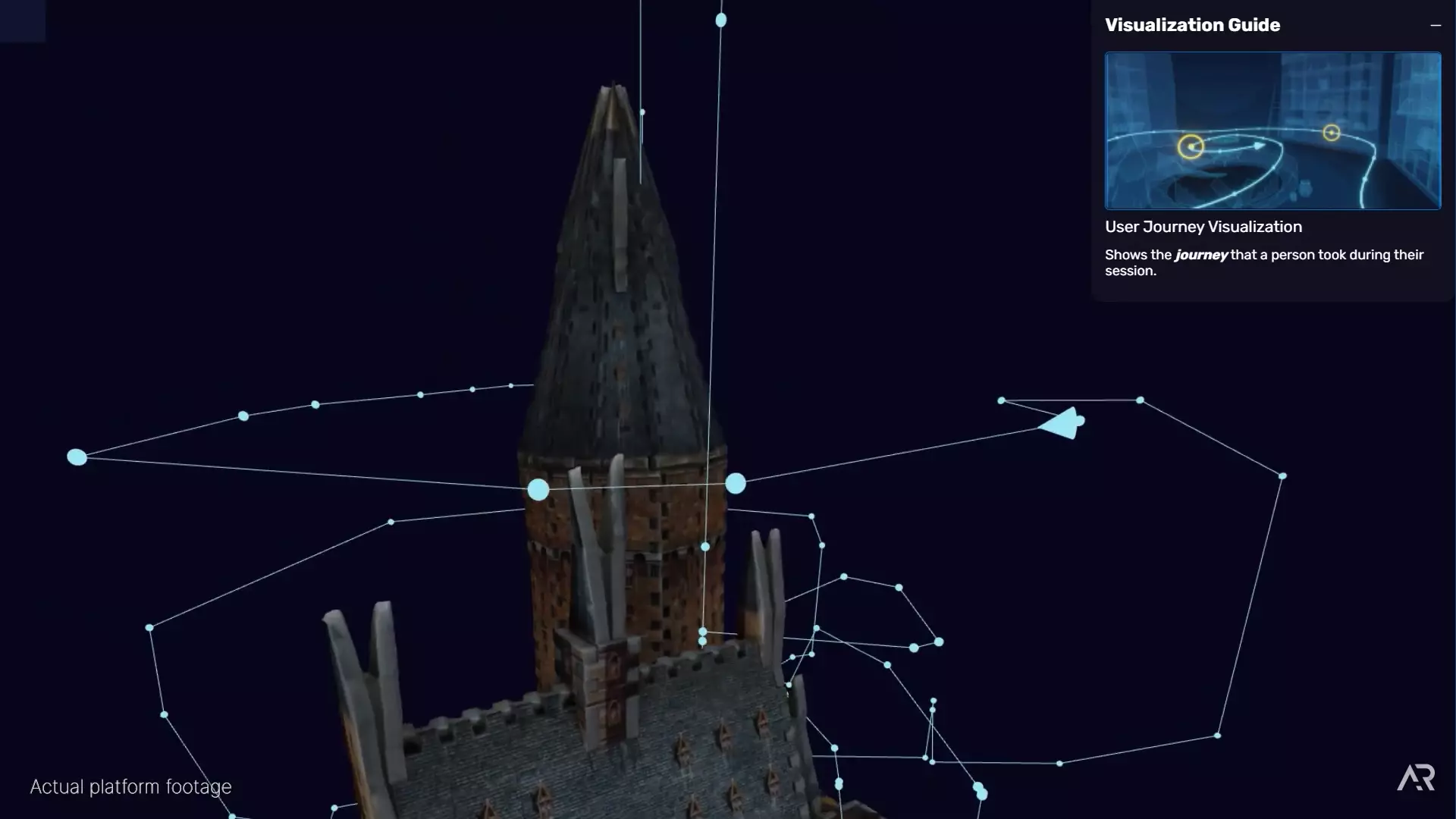
With heatmaps and gaze maps, metaverse companies could see high-traffic locations and what objects receive the most attention.
Opportunities:
- Metaverse growth: With the rise of metaverse apps, the interest in specialized data analytics platforms will grow too.
- Unique data insights: Metaverse data analytics platforms provide unparalleled insights into user preferences, engagement, and community dynamics.
- Versatile applications: Metaverse data analytics will be valuable in various fields, including marketing, e-commerce, education, healthcare, and even urban planning.
Challenges:
- Technical complexity: Processing and analyzing enormous volumes of 3D spatial data and thousands of user interactions requires advanced technological expertise and powerful infrastructure.
- Evolving standards: It’s one of the most fresh business ideas in the metaverse. That’s why data formats and analytics methodologies are yet to be standardized.
Monetization strategies:
- Offering tiered subscriptions based on feature availability and data points
- Offering consulting services: analyzing company’s metaverse data and providing recommendations
- Charging for APIs that allow other companies to seamlessly integrate your data analytics tools into their systems
Competitors: Metalitix, CORTEXR, Cookie3, Landvault, Landindex
Our Experience with Metaverse Development
Redwerk is an established IT services agency with expertise in metaverse development. Since 2005, we’ve built countless web2 & web3 solutions. Let’s dive deeper into some of our most recent projects.
Human Park
Human Park is a metaverse with an emphasis on self-expression, developed collaboratively by Virtually Human Studio and Spectre Studios, leading Australian XR companies. Here, players initiate their adventure with a ‘Nood’, a basic character, customizable with unique designs and features. The platform offers exploration, interaction, and various games like tag and hide-and-seek, along with special in-game events.
Human Park reached out to us to help them polish the game before its early release. The playground hasn’t been completed yet, but the Human Park team wanted to build excitement around the game and airdrop avatar NFTs to about 30,000 waitlist users. To do that, they needed to be sure that the first interaction with the game and the avatar customization were seamless.
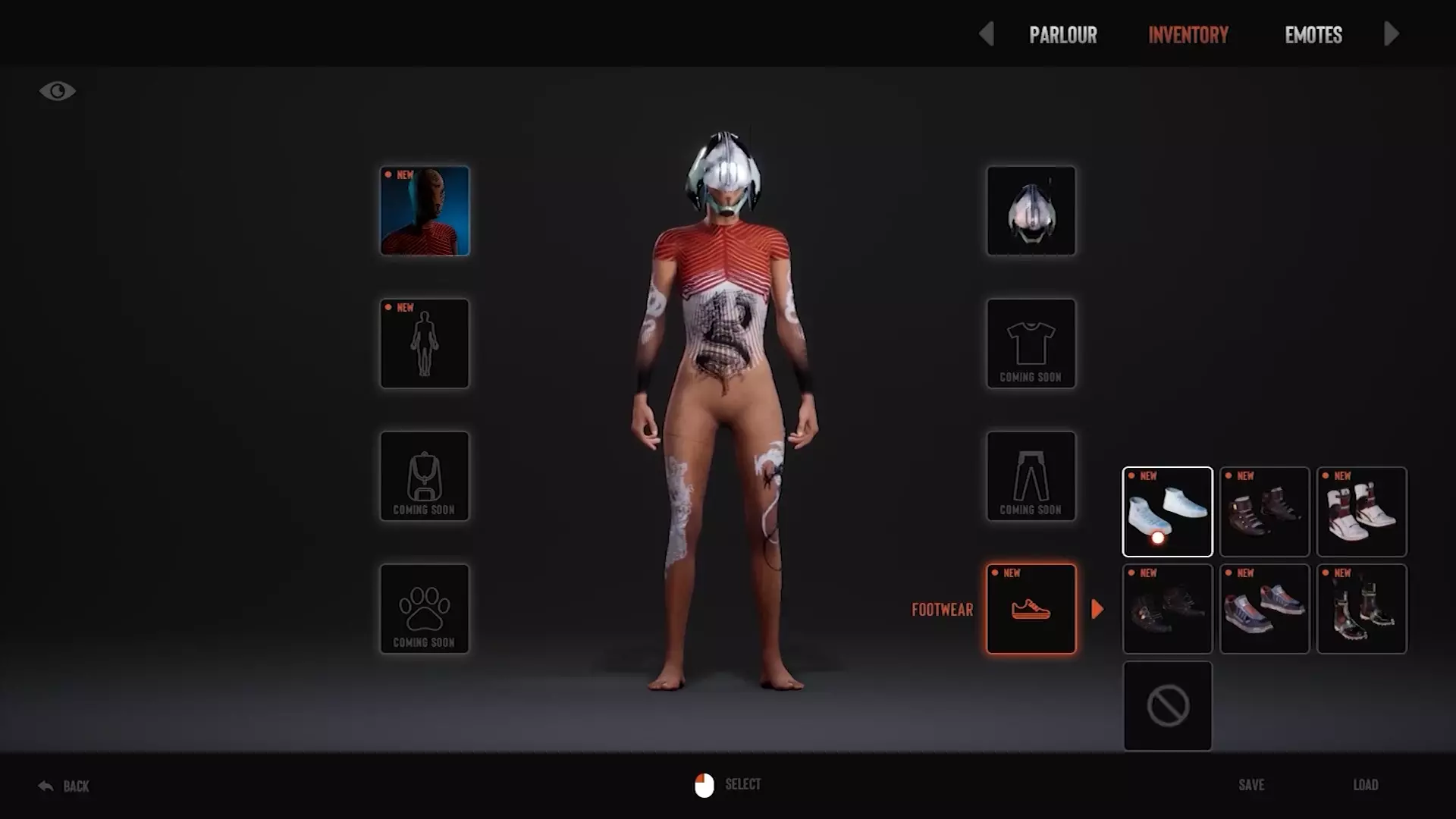
Our QA services for Human Park included an in-depth testing of the installation process, launch, and avatar configurator. We reported several functional, UI, and localization issues. With our support, Human Park was able to host their mint event for early adopters, knowing everything would run smoothly.
Couple Up!
Couple Up! is a love reality show simulation. It’s a mobile experience created by Native Games Studio, a Ukrainian indie game developer. With a rapid growth of their user base, they needed to ensure they can accommodate large numbers of players.
To tackle this, Native Games Studio partnered with Redwerk. Our goal was to spot any performance hitches and fix them. We conducted thorough load testing, checked the server setup, and performed a code review.


We observed that their server struggled most under the load of 1000 users added in 10 seconds, taking up to 27 seconds to respond. This is nine times higher than the expected response time. Our DevOps engineers provided our client with a comprehensive list of configurations to optimize the server performance. Our code review report included both short-term and long-term fixes aimed at improving performance and scalability.
Highrise City
Highrise City is a fresh take on city simulations and tycoon games, developed by German-based Deck 13 Spotlight. Unlike traditional city builders, the game is all about managing the production chains well to establish an ever-growing, thriving metropolis. It’s a combination of city simulation and economy & resource management genres.
Deck 13 turned to Redwerk to have a second look at their game’s performance. We performed load and stress testing in different environments to identify potential reasons for crashes.

While we didn’t find any crashes, the game was running at an unplayable FPS of 1-10 seconds under certain environment configurations. We also reported what system requirements, software and driver issues can contribute to crashes. With our help, Highrise City understood where the bottlenecks lie and what aspects may contribute to negative user reviews.
What Else We Do
Besides helping you identify crashes, get to the root cause of performance issues, and providing an unbiased look on your codebase health, we can help you with a range of other tasks sitting in your backlog, such as:
- Game development. Whether you need help with client- or server-side development, we’ve got you covered.
- Game porting. Let us help you port your PC game onto consoles and mobile devices so that you reach a broader audience.
- Blockchain integration. Looking to develop a web3 game? We have a long-standing expertise in blockchain development. Redwerk is the developer of BAMM, layer 3 transport protocol for building highly secure dapps.
- UI/UX optimization. We can help you design intuitive interfaces for seamless player interaction, ensuring a highly satisfying gameplay experience.
- Localization testing. Need to make sure the game layout remains consistent and sleek in all supported languages? We can save you time and take care of that.
- Server and network optimization. Evaluate your game’s backend infrastructure and scalability to ensure you can provide lag-free experiences for millions of players.
The best way to understand if we’re the right tech solution provider for your needs is to contact us and submit your inquiry. We’ll arrange a brief discovery session with you to get to know each other and move from there.
Frequently Asked Questions
How do I start a business in the metaverse?
Starting a metaverse business requires:
- Identifying your target audience and their needs
- Crafting a business plan
- Deciding between existing platforms or custom metaverse development.
- Deciding on in-house vs outsourced software development.
- Prototyping, iterating, and validating your product idea before full development
- Leveraging online communities, influencers, and metaverse-specific channels for marketing
- Gathering feedback, analyzing data, and adapting to user needs and trends post-launch
What challenges might entrepreneurs face in the metaverse?
Driving user adoption is something existing metaverse platforms like Decentraland and The Sandbox have struggled with.
Another major challenge is the technical complexity of such platforms. This increases expenses on software development and maintenance.
Can small businesses compete in the metaverse?
There are several ways how small businesses can compete in the metaverse:
- Focus on niche expertise and fill in the gaps that large players overlooked
- Build a strong and loyal community by interacting with them regularly and offering personalized experiences
- Partner with established players or other small businesses to expand your reach
How can traditional businesses adapt to the metaverse?
The easiest way is to participate in virtual events hosted on established metaverse platforms.
A large enterprise may want to build a digital twin of their manufacturing facilities to improve employee onboarding and experiment with workflow changes without shutting down an assembly line.
For a small business, it may be enough to explore off-the-shelf or low-code metaverse platforms, what they offer, and think of brand promotion activities on those platforms.
Can metaverse businesses be profitable?
Of course! Metaverse businesses have the early-mover advantage. By entering the market early, they have a better chance at establishing their name and building a strong customer base before competition becomes too fierce.
With a well-defined plan, a strong understanding of the market, and a willingness to innovate and pivot as the metaverse evolves, metaverse businesses stand a good chance to be profitable.
See how we developed
a cross-platform MMO game
inspired by US elections
